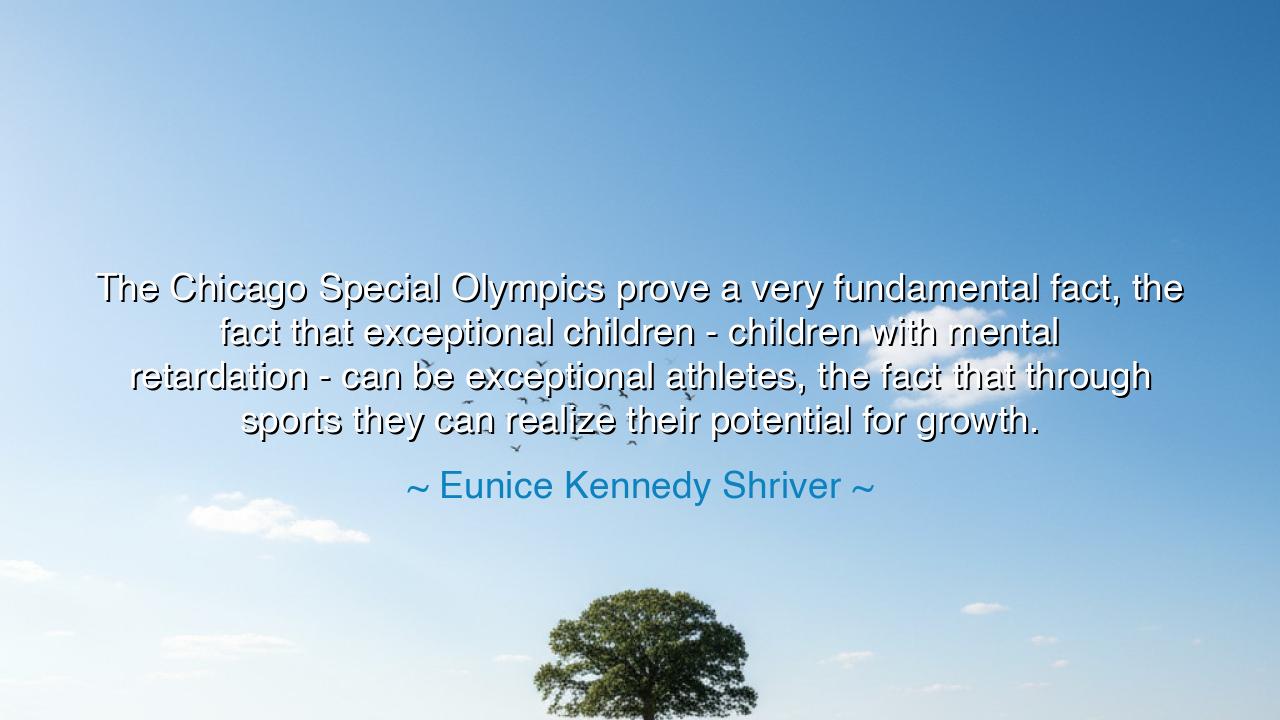
The Chicago Special Olympics prove a very fundamental fact, the
The Chicago Special Olympics prove a very fundamental fact, the fact that exceptional children - children with mental retardation - can be exceptional athletes, the fact that through sports they can realize their potential for growth.






Eunice Kennedy Shriver once proclaimed, “The Chicago Special Olympics prove a very fundamental fact, the fact that exceptional children – children with mental retardation – can be exceptional athletes, the fact that through sports they can realize their potential for growth.” These words carry not only the warmth of compassion but the thunder of revolution. For in her time, society too often cast aside those with intellectual disabilities, treating them as if they had no gifts to share, no victories to win, no place in the arena of human greatness. Yet Shriver, with the fire of vision, declared a truth as ancient as humanity itself: every soul is capable of greatness, and sports can be the vessel through which that greatness shines.
The Special Olympics, first held in Chicago in 1968, were not merely games, but a rebuke to centuries of neglect. In those fields, children once dismissed as incapable sprinted, jumped, and threw with determination that shook the hearts of all who watched. The “fundamental fact” Shriver spoke of was not merely athletic ability—it was human dignity revealed through motion, struggle, and triumph. She showed the world that to be “exceptional” did not mean to be less; it meant to have a unique strength waiting to be called forth.
The ancients knew the sacred power of sports. To them, athletics was never only about victory, but about growth, about shaping the character and the soul. In Olympia, men competed not simply to win laurel crowns but to embody the highest ideals of discipline and perseverance. Shriver’s vision extended this same ancient truth to children whom society had denied. She understood that when they ran, when they played, when they trained, they too were not only exercising their bodies but also realizing their potential for growth.
History offers many examples of this principle. Think of Wilma Rudolph, who as a child was stricken with polio and told she would never walk again. Through persistence and sports, she not only walked but became an Olympic champion, the fastest woman in the world. Her story mirrors the truth Shriver proclaimed: limitations are not destiny, and with opportunity, the human spirit can rise above every barrier. The Special Olympics are filled with countless such stories—athletes who, given the chance, defied expectations and revealed courage more profound than medals alone can honor.
The emotional power of Shriver’s words comes from their tenderness toward the most vulnerable and their strength in defending their dignity. She did not speak of charity or pity, but of potential. She refused to see children with disabilities as broken; she saw them as champions waiting to be unleashed. Through sports, they found community, self-belief, and the taste of victory. And through watching them, the world was forced to confront its own prejudices, and to bow before the truth of their strength.
For the seeker of wisdom, the lesson is luminous: never underestimate the power hidden within another human being. The labels of society—“disabled,” “weak,” “unfit”—are shadows that conceal the light within. But when given opportunity, encouragement, and the tools to strive, every person can achieve greatness. The playing field becomes the proving ground of dignity, reminding us that all are capable of growth, and all are worthy of respect.
What then must we do? Support opportunities that lift the forgotten, whether through sports, education, or work. Encourage those whom others ignore. Create spaces where every person, regardless of limitation, can test themselves and taste the joy of achievement. And above all, recognize the truth Shriver proclaimed: sports have the power not only to crown champions but to awaken the human spirit in all its forms.
Thus, Eunice Kennedy Shriver’s words endure as a call to compassion and courage: the Special Olympics are not about what these children cannot do, but about all they can. They are proof that growth belongs to everyone, that potential lies in every heart, and that by giving opportunity, we unleash dignity and greatness that uplift not only the individual, but all of humanity.






AAdministratorAdministrator
Welcome, honored guests. Please leave a comment, we will respond soon